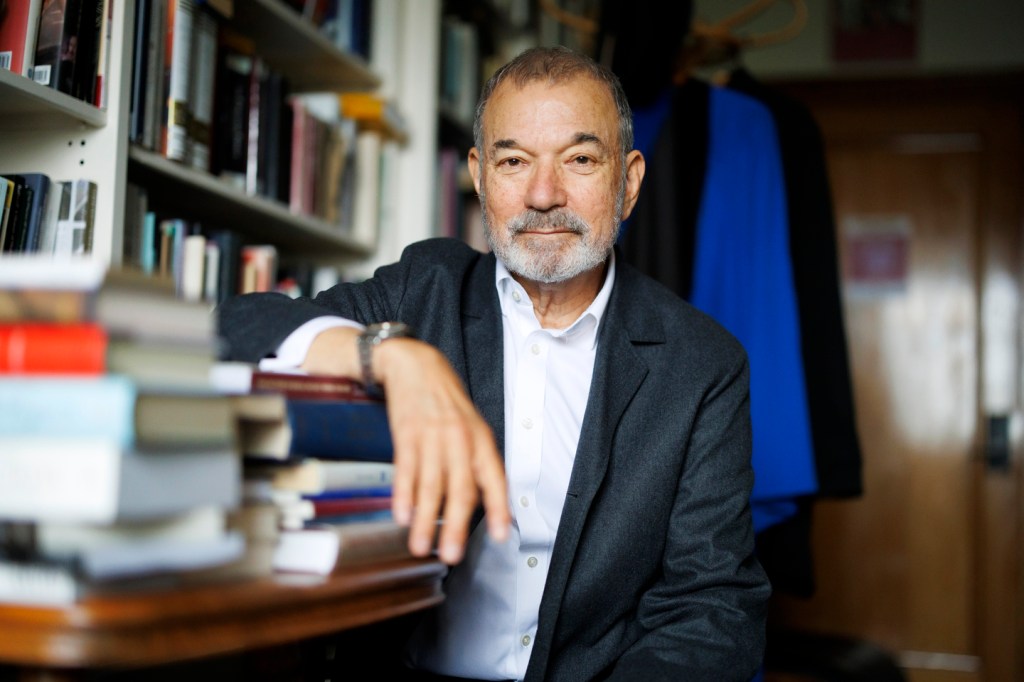‘Goodnight, sweet prince’

Illustration by Liz Zonarich/Harvard Staff
New holiday film reimagines couple’s searing grief over death of young son, how it inspired creation of ‘Hamlet’
William Shakespeare is the most celebrated playwright in the English language, but we really know so little about him.
He wrote 154 poems and about 39 plays between 1592 and 1612. But he didn’t leave diaries, journals, or any other biographical record, so his “passionate life — his access through personal experience and observation to the intense emotions he represents — is almost completely mysterious,” according to Stephen Greenblatt, John Cogan University Professor of the Humanities and one of the foremost experts on the Bard of Avon.
Scholars agree that this much is known: Shakespeare was born in Stratford, England, in 1564 and died in 1616. At 18, he married Anne (also known as Agnes) Hathaway, who was 26 years old. They had three children: Susanna, and twins Judith and Hamnet, who died at 11 of an unrecorded cause. The family lived in Stratford and Shakespeare in London, where he plied his trade for two decades.
The upcoming holiday season film “Hamnet,” based on a 2020 bestselling novel by Maggie O’Farrell, fills in some of the gaps in Shakespeare’s life with marvels of historical fiction. O’Farrell’s book reimagines the life of Shakespeare’s family and delves into the grief and loss over the death of the young boy and how it led to the creation of one of the playwright’s greatest works.

Jessie Buckley stars as Agnes and Paul Mescal as William Shakespeare in director Chloé Zhao’s Hamnet, a Focus Features release.
Photo by Agata Grzybowska – © 2025 – Focus Features
It is “a story of deep loss,” Greenblatt wrote in a 2021 review of O’Farrell’s book, “and its impact upon a marriage that was already buckling under almost intolerable strain.” He added, “With her touching fiction O’Farrell has not only painted a vivid portrait of the shadowy Agnes Hathaway Shakespeare but also found a way to suggest that Hamnet was William Shakespeare’s best piece of poetry.”
“With her touching fiction O’Farrell has not only painted a vivid portrait of the shadowy Agnes Hathaway Shakespeare but also found a way to suggest that Hamnet was William Shakespeare’s best piece of poetry.”
Stephen Greenblatt
Moviegoers who insist on verifiable historical accuracy, be forewarned: In the new telling, written by O’Farrell and Oscar-winning director Chloé Zhao, Hamnet dies of the plague, which according to Greenblatt, seems a “reasonable hypothesis,” since the disease was commonplace in 17th-century England.
Also, in O’Farrell’s story, the love between Shakespeare and his wife survives their son’s death. For Greenblatt, that is a surprising plot twist. “I have a very different account of the relationship between Shakespeare and his wife,” Greenblatt said.
In his review, Greenblatt wrote that “scattered archival traces” suggest an “unhappy marriage.” He pointed to Shakespeare’s will, which lacks “any significant bequest to his wife of 34 years,” or any terms of endearment, which was customary at that time. Shakespeare bequeathed his wife his “second best bed with the furniture.”
Greenblatt continued, “There is no evidence that the busy playwright shared his rich inner world with his wife or that he involved himself in the daily lives of his offspring.”
But there is a point of agreement between the scholar and the fiction writer: the possible link between Hamnet’s death and the writing of “Hamlet.”
In the 2004 article “The Death of Hamnet and the Making of ‘Hamlet,’” Greenblatt argues that “Hamlet” could be traced to Shakespeare’s “personal experience of grief” over his son’s death.
The play was written in or around 1600, four years after Hamnet’s death, and is among “one of the deepest explorations of grief and loss ever written,” Greenblatt said.
For her part, O’Farrell said, in a 2020 interview with the Folger Shakespeare Library, that she believes it unlikely that “without [Hamnet’s] death, we would have the play ‘Hamlet.’” She said she first heard about Hamnet in high school from an English teacher and she had always been intrigued by “the link between this lost boy and this stupendous tragic play.”
In Greenblatt’s view, “Hamlet” must have been fueled by Shakespeare’s own heartache and the “accidental conjunction of names” because Hamnet and Hamlet were interchangeable in Stratford records of the era.

Stephen Greenblatt.
Stephanie Mitchell/Harvard Staff Photographer
“Most interesting, of course, is that among Shakespeare’s Stratford friends was a couple, Hamnet and Judith Sadler,” Greenblatt said. “When Shakespeare and his wife had twins, they named them Hamnet and Judith. Elizabethan spelling being quite irregular — names were spelled in a startling range of ways — it was not difficult to confound the names Hamnet and its close cousin Hamlet.”
The legend of Hamlet, a Danish prince, and his revenge for the murder of his father had been around for centuries, said Greenblatt. Shakespeare’s principal source of inspiration for his “Hamlet” was an account by a French writer, François de Belleforest, he said.
Scholars agree that a play about Hamlet had been performed on the English stage and was likely authored by Thomas Kyd, an English playwright and Shakespeare’s contemporary. The play didn’t survive.
“Scholars call the lost play the Ur-‘Hamlet,’ that is, the ‘original’ ‘Hamlet,’ but there was nothing original about it,” said Greenblatt.
It is likely that as the leading playwright in a theater company of which he was a shareholder, Shakespeare decided to take on ‘Hamlet.’
“If the so-called Ur-‘Hamlet’ was exciting the London public, then Shakespeare may have decided — or been pressured by his colleagues — to do his own version,” said Greenblatt.
“The trouble, of course, for everyone else is that Shakespeare was an astonishing genius. We know almost nothing about the Ur-‘Hamlet’ except that whoever wrote it seems to have come up with the idea of the ghost who calls for revenge — that was not part of the legend. In other words, the ghost was not Shakespeare’s own idea. But just think of what Shakespeare did with it.”




